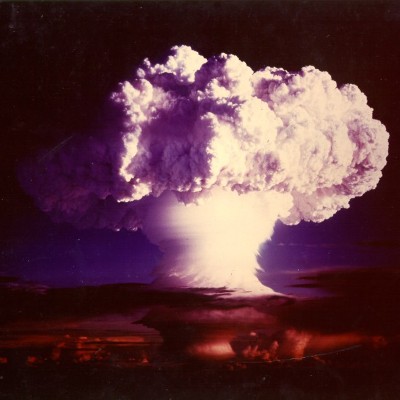|
Existential Risk From Climate Change
A climate apocalypse is a term used to denote a predicted scenario involving the global collapse of human civilization due to climate change. Such collapse could theoretically arrive through a set of interrelated concurrent factors such as famine, extreme weather, war and conflict, and disease. There are many similar terms in use such as climate ''dystopia'', ''collapse'', ''endgame'', and ''catastrophe''. Meaning of the term A ''climate apocalypse'' could theoretically arrive through a set of interrelated concurrent factors such as famine (crop loss, drought), extreme weather (hurricanes, floods), war (caused by the scarce resources) and conflict, systemic risk (relating to migration, famine, or conflict), and disease. Scientific consensus regarding likelihood Origin Rhetoric and belief centered on apocalypticism has deep roots in religious contexts, and similar rhetorical approaches undergird secular apocalyptic interpretations of climate. Historical interpretations ... [...More Info...] [...Related Items...] OR: [Wikipedia] [Google] [Baidu] |
Four Horsemen Of The Apocalypse
The Four Horsemen of the Apocalypse are figures in the Book of Revelation in the New Testament of the Bible, a piece of apocalypse literature attributed to John of Patmos, and generally regarded as dating from about AD 95. Similar allusions are contained in the Old Testament books of Ezekiel and Zechariah, written about six centuries prior. Though the text only provides a name for the fourth horseman, subsequent commentary often identifies them as personifications of Conquest ( Zelos/ Zelus), War (Ares/Mars), Famine ( Limos/ Fames), and Death ( Thanatos/ Mors or Moros/ Fatum). Revelation 6 tells of a book or scroll in God's right hand that is sealed with seven seals. The Lamb of God/Lion of Judah opens the first four of the seven seals, which summons four beings that ride out on white, red, black, and pale horses. All of the horsemen save for Death are portrayed as being human in appearance. In John's revelation the first horseman rides a white horse, carries a bow, and is ... [...More Info...] [...Related Items...] OR: [Wikipedia] [Google] [Baidu] |
Doomsday Scenarios
A global catastrophic risk or a doomsday scenario is a hypothetical event that could damage human well-being on a global scale, endangering or even destroying modern civilization. Existential risk is a related term limited to events that could cause full-blown human extinction or permanently and drastically curtail humanity's existence or potential. In the 21st century, a number of academic and non-profit organizations have been established to research global catastrophic and existential risks, formulate potential mitigation measures, and either advocate for or implement these measures. Definition and classification Defining global catastrophic risks The term global catastrophic risk "lacks a sharp definition", and generally refers (loosely) to a risk that could inflict "serious damage to human well-being on a global scale". Humanity has suffered large catastrophes before. Some of these have caused serious damage but were only local in scope—e.g. the Black Death may ... [...More Info...] [...Related Items...] OR: [Wikipedia] [Google] [Baidu] |
Human Extinction
Human extinction or omnicide is the hypothetical end of the human species, either by population decline due to extraneous natural causes, such as an asteroid impact or large-scale volcanism, or via anthropogenic destruction (self-extinction). Some of the many possible contributors to anthropogenic hazard are climate change, global nuclear annihilation, biological warfare, weapons of mass destruction, and ecological collapse. Other scenarios center on emerging technologies, such as advanced artificial intelligence, biotechnology, or self-replicating nanobots. The scientific consensus is that there is a relatively low risk of near-term human extinction due to natural causes. The likelihood of human extinction through humankind's own activities, however, is a current area of research and debate. History of thought Early history Before the 18th and 19th centuries, the possibility that humans or other organisms could become extinct was viewed with scepticism. It contra ... [...More Info...] [...Related Items...] OR: [Wikipedia] [Google] [Baidu] |
Global Catastrophic Risk
A global catastrophic risk or a doomsday scenario is a hypothetical event that could damage human well-being on a global scale, endangering or even destroying modern civilization. Existential risk is a related term limited to events that could cause full-blown human extinction or permanently and drastically curtail humanity's existence or potential. In the 21st century, a number of academic and non-profit organizations have been established to research global catastrophic and existential risks, formulate potential mitigation measures, and either advocate for or implement these measures. Definition and classification Defining global catastrophic risks The term global catastrophic risk "lacks a sharp definition", and generally refers (loosely) to a risk that could inflict "serious damage to human well-being on a global scale". Humanity has suffered large catastrophes before. Some of these have caused serious damage but were only local in scope—e.g. the Black Death ma ... [...More Info...] [...Related Items...] OR: [Wikipedia] [Google] [Baidu] |
Global Catastrophe Scenarios
Scenarios in which a global catastrophic risk creates harm have been widely discussed. Some sources of catastrophic risk are ''anthropogenic'' (caused by humans), such as global warming,IPCC (November 11, 2013): D. "Understanding the Climate System and its Recent Changes", inSummary for Policymakers (finalized version), in: environmental degradation, and nuclear war. Others are ''non-anthropogenic'' or ''natural'', such as meteor impacts or supervolcanoes. The impact of these scenarios can vary widely, depending on the cause and the severity of the event, ranging from temporary economic disruption to human extinction. Many societal collapses have already happened throughout human history. Anthropogenic Experts at the Future of Humanity Institute at the University of Oxford and the Centre for the Study of Existential Risk at the University of Cambridge prioritize anthropogenic over natural risks due to their much greater estimated likelihood. They are especially concerned by, and ... [...More Info...] [...Related Items...] OR: [Wikipedia] [Google] [Baidu] |
Deep Adaptation
Deep Adaptation is a concept, agenda, and international social movement. It presumes that extreme weather events and other effects of climate change will increasingly disrupt food, water, shelter, power, and social and governmental systems. These disruptions would likely or inevitably cause uneven societal collapse in the next few decades. The word “deep” indicates that strong measures are required to adapt to an unraveling of industrial lifestyles, following prior usages such as deep ecology. The agenda includes values of nonviolence, compassion, curiosity and respect, with a framework for constructive action. Origin The concept of Deep Adaptation was introduced in the 2018 paper "Deep Adaptation: A Map for Navigating Climate Tragedy" by University of Cumbria sustainability leadership professor Jem Bendell. The paper was submitted to the Sustainability Accounting, Management and Policy Journal, but reviewers requested major revisions. Bendell then chose to self-publish ... [...More Info...] [...Related Items...] OR: [Wikipedia] [Google] [Baidu] |
Collapsology
The term collapsology or collapse studies are neologisms used to designate the transdisciplinary study of the risks of collapse of industrial civilization. It is concerned with the general collapse of societies induced by climate change, as well as "scarcity of resources, vast extinctions, and natural disasters." Although the concept of civilizational or societal collapse had already existed for many years, collapsology focuses its attention on contemporary, industrial, and globalized societies. Background The word ''collapsology'' has been coined and publicized by and Raphaël Stevens in their essay: (How everything can collapse: A manual for our times), published in 2015 in France. It also developed into a movement when Jared Diamond's text ''Collapse'' was published. Use of the term has spread, especially by journalists reporting on the deep adaptation writings by Jem Bendell. Collapsology is based on the idea that humans impact their environment in a sustained and ... [...More Info...] [...Related Items...] OR: [Wikipedia] [Google] [Baidu] |
Climate Crisis
''Climate crisis'' is a term that is used to describe global warming and climate change and their effects. This term and the term ''climate emergency'' have been used to emphasize the threat of global warming to Earth's natural environment and to humans, and to urge aggressive climate change mitigation and transformational adaptation. The term ''climate crisis'' is used by those who "believe it evokes the gravity of the threats the planet faces from continued greenhouse gas emissions and can help spur the kind of political willpower that has long been missing from climate advocacy". They believe, much as ''global warming'' provoked more emotional engagement and support for action than ''climate change'', calling climate change a crisis could have an even stronger effect. A study has shown the term ''climate crisis'' invokes a strong emotional response by conveying a sense of urgency. However, some caution this response may be counter-productive and may cause a backlash due t ... [...More Info...] [...Related Items...] OR: [Wikipedia] [Google] [Baidu] |
Abrupt Climate Change
An abrupt climate change occurs when the climate system is forced to transition at a rate that is determined by the climate system energy-balance. The transition rate is more rapid than the rate of change of the external forcing, though it may include sudden forcing events such as meteorite impacts. Abrupt climate change therefore is a variation beyond the variability of a climate. Past events include the end of the Carboniferous Rainforest Collapse, Younger Dryas, Dansgaard–Oeschger events, Heinrich events and possibly also the Paleocene–Eocene Thermal Maximum. The term is also used within the context of climate change to describe sudden climate change that is detectable over the time-scale of a human lifetime. Such a sudden climate change can be the result of feedback loops within the climate system or tipping points in the climate system. Scientists may use different timescales when speaking of ''abrupt events''. For example, the duration of the onset of the Paleoc ... [...More Info...] [...Related Items...] OR: [Wikipedia] [Google] [Baidu] |
Policy
Policy is a deliberate system of guidelines to guide decisions and achieve rational outcomes. A policy is a statement of intent and is implemented as a procedure or protocol. Policies are generally adopted by a governance body within an organization. Policies can assist in both ''subjective'' and ''objective'' decision making. Policies used in subjective decision-making usually assist senior management with decisions that must be based on the relative merits of a number of factors, and as a result, are often hard to test objectively, e.g. work–life balance policy. Moreover, governments and other institutions have policies in the form of laws, regulations, procedures, administrative actions, incentives and voluntary practices. Frequently, resource allocations mirror policy decisions. Policies intended to assist in objective decision-making are usually operational in nature and can be objectively tested, e.g. a password policy. The term may apply to government, public se ... [...More Info...] [...Related Items...] OR: [Wikipedia] [Google] [Baidu] |
Worst-case Scenario
A worst-case scenario is a concept in risk management wherein the planner, in planning for potential disasters, considers the most severe possible outcome that can reasonably be projected to occur in a given situation. Conceiving of worst-case scenarios is a common form of strategic planning, specifically scenario planning, to prepare for and minimize contingencies that could result in accidents, quality problems, or other issues. Development and use The worst-case scenario is " e of the most commonly used alternative scenarios".Charles Yoe, ''Principles of Risk Analysis: Decision Making Under Uncertainty'' (2011), p. 429-30. A risk manager may request "a conservative risk estimate representing a worst-case scenario" in order to determine the latitude they may exercise in planning steps to reduce risks.Nicholas P. Cheremisinoff, ''Environmental Technologies Handbook'' (2005), page 73-74. Generally, a worst-case scenario "is settled upon by agreeing that a given worst case is bad e ... [...More Info...] [...Related Items...] OR: [Wikipedia] [Google] [Baidu] |







